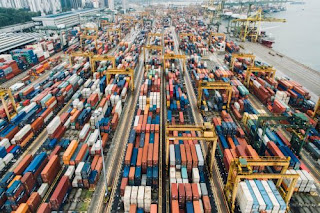The Potential Impact of the Ukraine Crisis on U.S. Manufacturers
Posted by IndustryNet on Tuesday, March 1, 2022
Just as pandemic-related supply chain bottlenecks begin to ease, U.S. manufacturers now face an unwelcome déjà vu of global supply chain disruptions emerging from the Russian invasion of Ukraine, further underscoring the role geopolitical risk plays in the reliability of global supply chains.
The Russia-Ukraine crisis has the potential to further upend global supply chains, trigger shortages of key supplies, drive up inflation, and poses significant cybersecurity risks. The impact is already being felt in Europe, with automotive plants dependent on Ukraine-made components shutting down and the prospect of food shortages and food inflation all but a certainty.
As the world’s eleventh largest economy, Russia is a major oil exporter and supplies critical materials for a wide range of manufactured product, impacting diverse industries, from auto and agricultural sectors to pharmaceuticals. As the crisis intensifies, U.S. manufacturers should be aware of the risks and potential impact on their business.
Supply Chains Risks
Although supply chain disruptions triggered by this crisis are not expected to be nearly as severe as they were during the pandemic, there could be notable impact for some companies.
According to supply chain risk management company Interos, more than 2,100 U.S. -based companies have least one direct (Tier 1) Russian supplier. These include a small percentage of items sourced in the industrial machinery, oil, gas, steel and metal categories.
But when considering more indirect (Tier 2 or 3) supplier relationships, the impacts to U.S. companies intensify, with more than 190,000 companies in the U.S. with tier 3 supplier relationships in Russia and 15,000 tier-2 relationships.
Materials Shortages
Both Russia and Ukraine are major export markets, supplying a wide range of critical materials to manufacturers around the world. Known as Europe’s breadbasket, Russia and Ukraine make up nearly a third of the world’s wheat exports.
Here are some specific commodities impacted by the crisis:
Metal Production: The conflict is already having an impact on the steel industry, with some raw materials exporters unable to move cargo out of Ukraine, setting off a domino effect across the global steelmaking industry. Russia is also a major supplier of nickel and platinum and also controls 10% of global copper reserves.
Semiconductor Manufacturing: The semiconductor sector is already contending with pandemic-related chip shortages, leading many to ask if the current crisis in Ukraine has the potential to make things worse. After all, both Ukraine and Russia are significant suppliers of specific gases and metals utilized in the chipmaking process, oftentimes for etching or lithographic purposes. Ukraine, for instance supplies 70% of the world’s neon, used in the lithographic aspect of chipmaking. Other key gases and metals supplied in the region include argon, xenon, krypton, hexafluorobutadiene (a gas used for etching), and palladium (used in making catalytic converters).
However, these potential supply issues had already been identified when Russia annexed Crimea in 2014, leading many chipmakers to diversify their supplier base at that time. In fact, The U.S. Semiconductor Industry released a statement to this effect recently, with SIA CEO John Neuffer stating, “The semiconductor industry has a diverse set of suppliers of key materials and gases, so we do not believe there are immediate supply disruptions risks related to Russia and Ukraine.”
Food Processing: Russia and Ukraine account for 29% of the global wheat export market. Other major food exports include barley, sunflower oil, and corn. While Europe is poised to be the hardest hit, the conflict could drive up food inflation even more in the U.S., impacting processors. Wheat and corn prices, for instance, are on the rise.
Prices
The economic disruption fueled by this crisis may drive up prices even more across a wide range of commodities. Oil prices have hit $100 a barrel for the first time since 2014. The price of aluminum is up 20% since this time last year, while palladium (used in the production of fuel cells) is up 26.7% over the same time period.
Shipping
The Russian-Ukraine crisis has the potential to drive up shipping costs beyond already-elevated rates, driven by a spike in crude oil prices. Global freight rates have been dropping generally since hitting a pandemic-related high in September 2021, but the freight industry is now watching the Ukraine situation closely, with its potential to spike rates for tanker, dry bulk and container shipping rates.
Cybersecurity Risks
The crisis poses a significant cybersecurity risk to businesses around the globe, with Russian cyber-attacks expected in response to sanctions imposed by the West. Ukraine’s infrastructure has already been hit with a rash of cyberattacks. Meanwhile, the U.S. cybersecurity and Infrastructure Security Agency released a “Shield’s Up” statement, encouraging all businesses to be prepared for the increased risk of cyber-attacks. Their guidance for all organizations can be found here. CISA is especially concerned about cyber-attacks on U.S. critical infrastructure, affecting a range of critical industries, including iron and steel mills, engine and turbine manufacturers, aerospace products and transformer manufacturers.
Crisis-Proof Your Supply Chain
While no one is immune to global supply chain disruptions, securing dependable, domestic suppliers is a winning strategy for protecting your supply chains from geopolitical risks. If you’re looking for domestic suppliers, start with IndustryNet, the free industrial marketplace, connecting millions of industrial buyers with suppliers of more than 11,000 products and services. Search, sort and quote for free by starting here.




